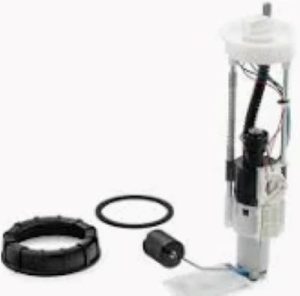These are fuel pumps from the aftermarket, meaning they were manufactured as a replacement to the original equipment manufacturer (OEM). It's a good option for when replacing a factory-installed fuel pump, as they come in just about any range of performance/cost/quality you can think of. Aftermarket fuel pumps generally cost between $100 to $300 each, depending on the brand and flow rate to fit your vehicle – a cheaper price point compared to OEM pumps that can range from $200 to $500.
Aftermarket fuel pumps are designed to fit specific engines and engine requirements, with various options ranging from flow rates to pressure ratings. Aftermarket pumps for typical cars offer 100 to 150 LPH throughput which is good enough to keep fuel pressures in the range of 40 to 60 PSI. Aftermarket fuel pumps can be rated up to 255 LPH (or more) in the case of high-performance vehicles and modified or turbocharged engines that require extra feed beyond what a stock pump provides. Selecting the fuel-flow rate is important to ensure the engine performance can be maintained — even a 10% decrease in flow will lead to not meeting targets and cause misfires.
The fuel pumps are also currently available through the aftermarket for modifications beyond stock fuel pump capabilities. An aftermarket pump with high flow for inspiration, in order to support engines with higher power outputs, as it used in race or a heavily modified street car. Capable of flowing 30% more fuel than stock OEM pumps, these high-performance pumps are perfect for applications that put a strain on the factory system and need more fuel flow to keep combustion in check and performance up.

Aftermarket fuel pumps are often of less quality; [and] durability is another question. Specifications vary by model, but good-quality aftermarket pumps are typically made with stronger materials to handle higher-pressure and longer-lasting use before requiring service; on average, that's between 100,000 and 150,000 milesDrawbacks of replacement water pumpsContributor Josh Sadlier. On the flipside, less expensive aftermarket pumps may not last as long, and if installed incorrectly, could fail sooner than normal. For example an inefficiently built aftermarket fuel pump can reduce the efficiency by up to 15%, this will result in higher fuel usage and thus reduced vehicle performance.
While their quality usually carries over to the rest of their fuel pumps, there is still one big problem with most aftermarket fuel pumps: compatibility. And though many are technically universal (in that they'll work with any fuel system- the pump matches a given vehicle's OEM specs for inlet and outlet size as well as for electrical hookup). A poor fit can create fuel leaks, reduce pressure, and even harm the fuel system. Opting for a big name you can trust will automatically offset these risks in the automotive area.
The aftermarket has seen a flourishing of fuel pumps which adds new performance options to our catalogue, alongside far more reasonably priced original parts. The 2015 SEMA Show, for example, played host to a variety of aftermarket fuel pump manufacturers and their latest concepts centered around improving vehicle performance; demonstrating the fact that solutions can be tailor made around individual vehicle needs through the use of fuel pumps.
For best information about aftermarket Fuel Pump options and installation kindly visit our webpage Best Fuel Pump.